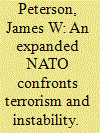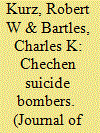| Srl | Item |
| 1 |
ID:
080338


|
|
|
|
|
| Publication |
2007.
|
| Summary/Abstract |
Recent expansion of NATO to include new members is inextricably linked to the twenty-first century battle against terrorism and instability. The sharp increase in membership after 1999 offered new capabilities to the alliance but also created additional complications and challenges in that battle. The new members played an immediate role in critical operations in Iraq, Afghanistan, Kosovo, and Bosnia. They enhanced alliance capabilities such as the NATO Reaction Force. Plans developed for possible location of U.S. military bases in new alliance partners such as Poland and the Czech Republic. NATO leaders expanded the Partnership for Peace Program to Serbia, Montenegro, and Bosnia-Herzegovina. In fact, transformation of NATO from an organization designed to counter the Soviet threat into an alliance that managed the battle against terrorism in Afghanistan had taken place by late 2006. At the same time, the costs that accompanied the deepened involvement in the current struggle against violence and instability raised profoundly difficult questions for both publics and governments in the new member states
|
|
|
|
|
|
|
|
|
|
|
|
|
|
|
|
| 2 |
ID:
080340


|
|
|
|
|
| Publication |
2007.
|
| Summary/Abstract |
U.S. military commanders and others in the defense community are concerned that militant Chechens, trained in suicide bombing and extremist tactics, are available to support Taliban elements in Afghanistan today. In reality, the relationship between these two groups is minimal and there is little likelihood of substantive cooperation between them. This position becomes clear after a brief review of Chechnya's history regarding Islam, its extremist groups, and its chronology of suicide bombings.
|
|
|
|
|
|
|
|
|
|
|
|
|
|
|
|
| 3 |
ID:
080337


|
|
|
|
|
| Publication |
2007.
|
| Summary/Abstract |
Missile defenses have become a source of controversy between the United States and Russia, out of proportion to their technological capabilities and in negligence of strategic and political realities. Cooler heads should prevail. U.S. or other national missile defenses will not abolish mutual deterrence based on assured retaliation. In addition, whether defenses support or undermine deterrence is a question of political intent, not of technology determinism. U.S. missile defenses deployed in Europe, for example, might be provocateurs of Russian distrust or they might be instruments of collaborative research and development under a regime of cooperative security.
|
|
|
|
|
|
|
|
|
|
|
|
|
|
|
|
| 4 |
ID:
080339


|
|
|
|
|
| Publication |
2007.
|
| Summary/Abstract |
Up to the late 1980s, the European Arctic was among the most heavily militarized regions in the world. After the end of the Cold War, however, the Russian Northern Fleet, based on the remote Kola Peninsula, went into a state of crisis and decay. Investments dried up and there was little political will to modernize the country's sea-based nuclear deterrence forces. But centrally placed actors in the Defense Ministry, the General Staff and the Military-Industrial Complex wanted to revitalize the once powerful and feared nuclear fleet. First Deputy Defense Minister (1992-1997) Andrei Kokoshin wrote a secret concept on how to create a new "Strategic Bastion" in the North. This article discusses the concept's background, content, and consequences
|
|
|
|
|
|
|
|
|
|
|
|
|
|
|
|
| 5 |
ID:
080341


|
|
|
|
|
| Publication |
2007.
|
| Summary/Abstract |
This article discusses Russia's use of "illegals" for espionage purposes, using the recent Canadian case of one "Paul William Hampel." Unmasked in November 2006, his case of was reminiscent another one a decade earlier which involved two Russians who also operated under false Canadian identities. Although we do not know how much of a role simple luck or poor Russian tradecraft played in Hampel's case, that Russia is still using Canada for espionage purposes should not come as a surprise. One of the few tools Russia has absent a strong economy and rejuvenated armed forces, is its intelligence apparatus. Hampel's case should serve as a warning to all well-established advanced democracies: espionage is as important today as it ever was in the pursuit of a state's national interests
|
|
|
|
|
|
|
|
|
|
|
|
|
|
|
|